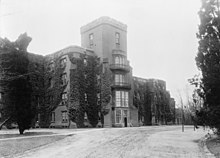Shepherd Ivory Franz

Shepherd Ivory Franz (May 27, 1874 – October 14, 1933) was an American
Biography
Early life
Shepherd Franz was born on May 27, 1874, in Jersey City, New Jersey, where Franz attended public schools. His father was a German immigrant.[1] Franz earned an undergraduate degree and a PhD in psychology from Columbia University.[2] Franz attended graduate school with Edward Thorndike and studied under James McKeen Cattell. He studied in Leipzig in Germany for one year but seldom encountered Wilhelm Wundt while he was there.[3]
Career

After graduate school, Franz joined Harvard University as an assistant in physiology.[2] He worked with Henry Pickering Bowditch and W. T. Porter on the feasibility of re-education in cats; Franz removed certain learned skills from cats through ablative brain surgery, then he retaught the skills to the cats. From 1901 to 1904, Franz taught psychology at Dartmouth College, then worked in psychological pathology at McLean Hospital until 1906.[4]
Franz was then a physiology professor at George Washington University School of Medicine & Health Sciences and a psychologist at the
After leaving the hospital, Franz moved to California to teach at the University of California, Los Angeles (UCLA). While there, he was named a professor of psychology the following year and remained on the faculty until his death.[5]
Contributions
Franz was interested in brain plasticity, which he called, among other names, "functional substitution." He interpreted a study by Karplus involving the corpus callosum and epilepsy as supporting the activation of a secondary pathway, stating, “If one pathway be blocked there is the possibility of using one or more normally little used routes,” and that the nonlesioned brain areas can take over the function.[5]
Another one of Franz’ interests was the localization of brain function. In 1902, Franz conducted a number of experiments on cats to figure out the relation of cerebrum's frontal lobes to the production and retention of simple sensorimotor habits. After a bilateral lesion of the frontal lobes, particular habits that Franz had created in the animals were lost. Unilateral lesions caused a slower motor response. These studies were similar to the ones he did with monkeys (cite).
Franz was interested in the role of the frontal lobes in the re-learning of learned behaviors (1906). In one study, he sectioned the frontal lobes of seven macaque and two ringtail monkeys. He used two tasks: one requiring a specific operant response which was to turn a button 90 degrees for the animal to receive the food. (cite) The other task was a chain of behaviors that Franz called the “Hurdle experiments” in which a monkey gets around and through obstacles to make their way to three boxes, the middle of which contains food that the monkey obtains after lifting the lid. (cite) After the animal had learned these two behaviors enough to demonstrate them quickly after not practicing for a week, their frontal lobes were removed and the experiment was repeated after surgery recovery. Similarly to what he found when working with cats, Franz found that the destruction of the frontal lobes caused the animals to lose habits, but they could acquire the same response again or new associations. With associations that were firmly established in the animal's brain by overlearning, the loss of the frontal lobes did not always cause the loss of these associations or habits. With this study, Frans suggested that the sensory and motor elements of the associations happen in certain areas of the brain stem, which means the associations are more reflexive than learned. He also suggested that after the loss of the frontal lobe function, the basal ganglia adjusted to the loss and took over. (cite) In rat experiments conducted alongside Karl Lashley, Franz found that rats that were either trained or overtrained in a food maze and had their frontal lobes destroyed did not lose their ability to re-learn the habit.[5]
Honors and achievements
Franz served as the fifth president of the
Death and legacy
Franz died in Los Angeles on October 14, 1933.
The psychology department at the University of California, Los Angeles is housed in Franz Hall. The university issues a teaching assistant award in his name.[8]
Selected works
Books
- Localization of Brain Function (1901)
- Handbook of Mental Examination Methods (1919)
- Nervous and Mental Re-Education (1923)
- Persons One and Three: A Study in Multiple Personalities (1933)
References
- ^ a b Thomas, Roger K. "Shepherd Ivory Franz (1874-1933)". University of Georgia. Archived from the original on April 20, 2012. Retrieved June 7, 2013.
- ^ . Retrieved June 7, 2013.
- ^ Thomas, Roger. "Shepherd Ivory Franz and the "Plagiarism" of Franz's Research by Kalischer". University of Georgia. Archived from the original on September 16, 2006. Retrieved June 7, 2013.
- ^ Devonis, David. Encyclopedia of the History of Psychological Theories. Springer Publishing.
- ^ S2CID 45175011. Retrieved June 7, 2013.
- ^ "Southern Society for Philosophy and Psychology: PAST OFFICERS". Southern Society for Philosophy and Psychology. Archived from the original on 20 April 2015. Retrieved 14 August 2015.
- ^ "Dr. Shepherd I. Franz, Psychologist, Dies; Head of Department at the University of California Succumbs at 59". The New York Times. October 15, 1933. Retrieved June 7, 2013.
- ^ "Department of Psychology Teaching Awards Ceremony". University of California, Los Angeles. Archived from the original on May 16, 2012. Retrieved June 7, 2013.
External links
 Works by or about Shepherd Ivory Franz at Wikisource
Works by or about Shepherd Ivory Franz at Wikisource
